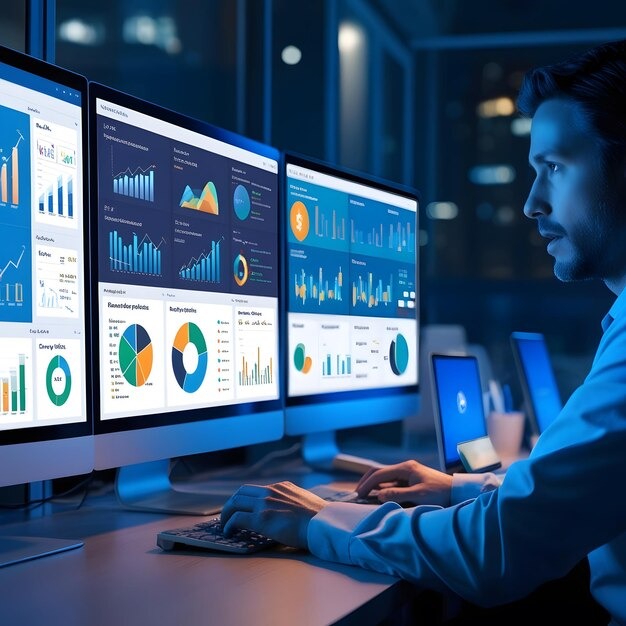Best Sustainability Reporting Software: A Complete Guide for Businesses

Introduction to Sustainability Reporting Software
In today’s world, sustainability is no longer an option; it has become a business necessity. Organizations are under increasing pressure to operate responsibly, reduce their carbon footprint, and ensure environmental, social, and governance (ESG) compliance. Stakeholders, investors, and customers want to know how companies contribute to sustainability goals. This demand has created a rise in the need for accurate, transparent, and reliable sustainability reporting. To manage this effectively, companies rely on the best sustainability reporting software that automates data collection, analyzes environmental performance, and generates compliance-ready reports. This blog explores the key features, benefits, and leading solutions in the sustainability reporting space.
Why Sustainability Reporting Matters
Sustainability reporting is the process of disclosing an organization’s ESG performance. It highlights environmental impact, energy usage, waste reduction, diversity initiatives, and governance policies. The importance of sustainability reporting lies in several factors. First, it enhances transparency, building trust among stakeholders. Second, it ensures compliance with global frameworks such as GRI (Global Reporting Initiative), SASB (Sustainability Accounting Standards Board), CDP (Carbon Disclosure Project), and the EU Corporate Sustainability Reporting Directive (CSRD). Third, sustainability reporting provides insights that help businesses identify risks, reduce costs, and improve operational efficiency. Finally, it strengthens a company’s brand reputation by showcasing commitment to sustainable practices.
Challenges in Sustainability Reporting
While sustainability reporting is crucial, it comes with challenges. Companies often struggle with gathering data across multiple departments and locations. Manually collecting ESG data is time-consuming and prone to human error. Another challenge is aligning reports with different standards, as organizations may need to comply with multiple frameworks. Ensuring accuracy and audit-readiness is also a hurdle, particularly for enterprises operating globally. To overcome these issues, organizations need the best sustainability reporting software that provides automation, real-time data analysis, and regulatory alignment.
What Makes the Best Sustainability Reporting Software
Choosing the right sustainability reporting software requires careful evaluation of its features. The best sustainability reporting software should provide comprehensive ESG data collection capabilities from multiple sources such as energy meters, supply chains, and HR systems. Automation is essential to eliminate manual errors and save time. Data visualization tools help present complex sustainability metrics in an easy-to-understand format. Integration capabilities with ERP, CRM, and financial systems ensure seamless data flow. The software should also offer compliance support for major reporting frameworks like GRI, SASB, TCFD, CDP, and CSRD. Scalability is crucial for organizations of all sizes, while cloud-based solutions ensure accessibility and real-time updates. Finally, customizable dashboards and AI-powered analytics make the software more effective.
Benefits of Using the Best Sustainability Reporting Software
The adoption of sustainability reporting software brings significant benefits. First, it ensures compliance with global sustainability standards, reducing the risk of penalties. Second, it saves time and resources by automating data collection and report generation. Third, it provides better decision-making through insights derived from real-time data. Fourth, sustainability reporting software enhances stakeholder trust and improves brand reputation by showcasing environmental responsibility. Fifth, it supports long-term business growth by identifying cost-saving opportunities, such as energy efficiency and waste reduction. For investors, reliable sustainability reporting highlights a company’s resilience and forward-thinking approach, making it a critical factor in investment decisions.
Key Features to Look for in Sustainability Reporting Software
When evaluating the best sustainability reporting software, businesses should consider essential features. These include:
-
Automated Data Collection: The software should pull data from different sources automatically, reducing errors.
-
Compliance with Standards: It should support frameworks like GRI, SASB, CDP, TCFD, and CSRD.
-
Data Visualization: Charts and dashboards simplify complex data for stakeholders.
-
Integration Capabilities: Smooth connection with ERP, HR, CRM, and financial systems.
-
Cloud Accessibility: Cloud-based solutions enable real-time reporting across global teams.
-
Audit-Readiness: Features like traceable data entries ensure accuracy for audits.
-
Customizable Dashboards: Businesses can tailor reports to match their sustainability goals.
-
AI and Predictive Analytics: Helps forecast sustainability performance and future risks.
Best Sustainability Reporting Software Solutions in 2025
With the growing demand for ESG reporting, numerous software solutions have emerged. Here are some of the best sustainability reporting software platforms available today:
1. Sphera
Sphera is a leading ESG software solution that provides advanced sustainability reporting features. It offers automated data collection, real-time dashboards, and strong compliance support. Organizations use it to streamline environmental, health, and safety (EHS) management, along with sustainability tracking.
2. Enablon
Enablon, a Wolters Kluwer company, provides an all-in-one ESG and sustainability management platform. It helps companies with compliance reporting, risk management, and sustainability analytics. Its scalability makes it suitable for large enterprises.
3. Workiva
Workiva is highly popular for financial and sustainability reporting. Its cloud-based platform integrates seamlessly with business systems, ensuring accurate ESG disclosures. Workiva’s flexibility and collaboration features make it one of the best sustainability reporting software solutions.
4. Diligent ESG
Diligent ESG focuses on governance and sustainability reporting. It allows companies to track ESG performance, align with global standards, and provide transparent reports to stakeholders. Its data-driven insights make it a preferred choice for enterprises.
5. Persefoni
Persefoni specializes in carbon accounting and sustainability reporting. It helps businesses calculate their carbon footprint, comply with climate disclosure frameworks, and set science-based targets. For organizations aiming for net-zero goals, Persefoni is an excellent choice.
6. Benchmark ESG
Benchmark ESG offers robust sustainability and compliance management solutions. It enables automated reporting, performance tracking, and predictive analytics. Its modular approach allows businesses to adopt features as needed.
7. IBM Envizi ESG Suite
IBM’s Envizi ESG Suite is a powerful solution that integrates AI and automation for ESG reporting. It collects sustainability data across multiple business units and aligns it with reporting standards. Its strength lies in scalability and AI-driven insights.
8. Ecochain
Ecochain is ideal for businesses focused on life-cycle assessments (LCA) and environmental impact analysis. It provides detailed insights into product sustainability and supply chain emissions. Ecochain’s strength lies in helping organizations design eco-friendly products.
9. FigBytes
FigBytes offers a holistic sustainability reporting solution that connects ESG data with business strategy. It provides visual storytelling for sustainability metrics, making it easier to engage stakeholders. Its integration capabilities and compliance support make it a strong contender.
10. Greenstone
Greenstone is widely recognized for its robust ESG reporting features. It supports multiple reporting frameworks, offers customizable dashboards, and enables carbon footprint analysis. Greenstone is well-suited for organizations looking for comprehensive reporting.
How to Choose the Best Sustainability Reporting Software for Your Business
Selecting the right software depends on business size, industry, and sustainability goals. Small businesses may prefer lightweight, cost-effective solutions with easy-to-use dashboards. Large enterprises need scalable platforms with multi-site data integration and advanced compliance features. Industry-specific requirements also play a role; for example, manufacturing companies may prioritize energy and waste management features, while financial institutions may need strong governance reporting tools. The budget, ease of implementation, and vendor support are additional factors to consider. Companies should request demos, evaluate trial versions, and compare multiple platforms before making a final decision.
Future Trends in Sustainability Reporting Software
The future of sustainability reporting software is driven by technological innovation. Artificial Intelligence (AI) will play a significant role in predictive analysis and scenario planning. Blockchain may be used to enhance transparency and traceability of sustainability data. Integration of Internet of Things (IoT) devices will allow real-time monitoring of emissions, energy usage, and resource consumption. Cloud-based solutions will continue to dominate, ensuring scalability and global accessibility. Additionally, as ESG regulations become stricter, the best sustainability reporting software will evolve to provide automated compliance updates and more user-friendly interfaces.
Conclusion: The Role of Software in Achieving Sustainability Goals
Sustainability reporting is no longer just a compliance requirement; it is a strategic necessity that impacts reputation, investor trust, and long-term growth. Businesses that adopt the best sustainability reporting software gain a competitive edge by ensuring accurate reporting, enhancing operational efficiency, and aligning with global ESG standards. With powerful tools like Sphera, Enablon, Workiva, Diligent ESG, Persefoni, and others, companies can manage their environmental and social responsibilities effectively. By choosing the right solution, businesses not only meet regulatory requirements but also contribute positively to a sustainable future. Investing in sustainability reporting software is not just about reporting—it is about shaping a greener, more responsible world.






